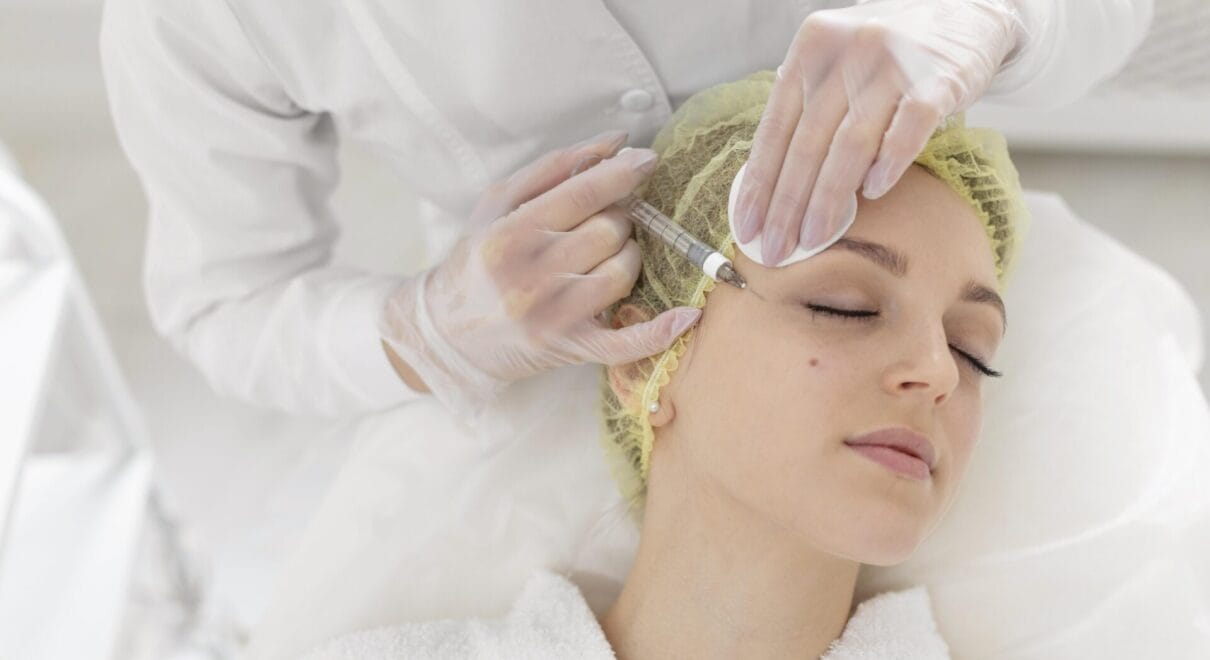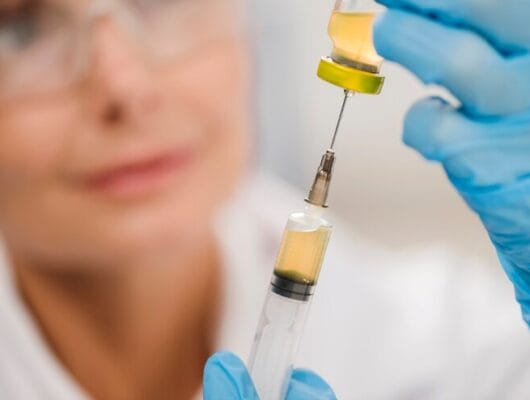It is often more essential than ever to find ways to optimize health and enhance performance. With the greater pressure imposed on people daily, we can hardly afford anything less than what is the best. As an outcome, the growing number of people who are in search of the right treatments can enhance their health while performing best at work and reducing the signs of aging. However, numerous treatments help that are being offered. A couple of the treatments are extremely promising and exciting, like peptide replacement therapy.
We are now going to check out the numerous forms of peptides available along with their numerous forms and functionalities being used across the medicinal world today.
What Are Peptides?
Peptides are short-chain amino acids found in the body. They are the building blocks of protein and are specifically designed to augment the human body’s distinctive functionalities.
Peptide therapies often use the sequences that are present for the regulation and the rejuvenating functions as they bind and inform the other cells in what to do while replacing or mimicking the functions of the naturally occurring peptides. These can use body chemistry relationships that promote restoration, homeostasis, and anabolism. The peptides would act as messengers relaying information or transporting materials right into cells, where peptides would effectively transfer glucose from the blood into the cells that are used as energy.
Hormones vs Peptides
Hormones often act intracellularly while modulating the different pathways. This is extremely different from the peptides that operate out of the cell. For instance, growth hormone is the specific hormone dedicated to growth, while the growth hormone-releasing peptide or GHRP operates upstream, modulating the level of the growth hormone. The administration of GH generates highly targeted results. Using the peptide would enable the body to self-regulate the level of the growth hormone as required by keeping the feedback loops intact. It is a subtle approach overall.
One of the serious perks of the peptides is that they are not accumulating within the body, which is particularly beneficial for individuals undergoing HRT therapy. As your body continues using them for signal purposes, breaking them down and recycling them poses no threat.
Whenever the amino acids form together, they create a peptide bond. The cells in the body consist of peptides. Generally, they get synthesized through the translation of mRNA into the signaling agents and the hormones. Alternatively, a few peptides would come in together, forming the enzymes. Suppose you are undergoing any condition stemming mainly from chronic stress, like adrenal fatigue or chronic infection. In that case, the addition of peptides will never add to the stress felt by the body.
What Is Peptide Therapy?
Peptide therapy generally involves the administration of unique peptides that influence a couple of physiological processes. These peptides form the smallest naturally occurring molecules, often comprising amino acids. They play a critical part in the complete regulation of numerous bodily functions, including metabolism, immune system responses, and neurotransmitting activities.
Peptides form the main components that impact numerous physiological processes within the body, including hormonal regulations and immune system responses. These include cell signaling since they inhibit or activate numerous enzymes, proteins, and receptors.
Peptide therapy generally involves the administration of peptide analogs or synthetic peptides that target unique physiological processes. These are the peptides that get administered orally, topically, or intravenously, depending on your much-needed effect. These would include the growth hormonal release of proteins that stimulate the release of growth hormone with melanocyte-stimulating hormonal peptides generally used to treat skin disorders such as vitiligo.
How Do Peptides Work?
Given that the human body synthesizes its peptides, topical application of more peptides has many advantages. It works since the peptides remind the other cells to do things like a key to unlock the other bodily activities. These are signal molecules that work like hormones and have a significant role in weight loss. In this way, by using peptides in a few particular mixtures and methods, you can achieve the regions where it is desirable to strengthen.
Therefore, it is essential to create more elastin and collagen, but how and why would this be a benefit? Notably, as people age, the human body slows down; this is the case in synthesizing several proteins and hormones. This is why our skin begins to sag and develop wrinkles and lines on our skin surface. Your body produces less collagen; most importantly, it is less efficient in the production of the specific compounds that lead to youthful characteristics. With the help of peptides, one can start increasing the hormone production to reach the most effective results.
Signs You Might Need Peptide Therapy
Peptides are involved in nutrient metabolism, exercise, and immune status or responses. Sermorelin before and after can be highly useful to both men and women, especially to those who desire to be more physically active.
Age causes a decline in the body’s production of amino acids, and this affects us as we reach our 40s. Peptide therapy is typically thought of when people are entering middle age.
- Higher levels of body fat, particularly around the abdomen
- Decreased libido, sexual function
- Fatigue
- Anxiety
- Sensitivity to heat and cold
- Decreased muscle mass
- Decreased stamina
While peptide therapy may not be for everyone, if you are a candidate for feeling tired all the time or struggling to lose weight and wish to know more about it, we can discuss it further.
Uses of Peptide Therapy
Autoimmune Conditions
A picture of a molecular view of an autoimmune illness Autoimmune is a condition such as rheumatoid arthritis or Hashimoto’s thyroiditis, and the antigens evolve with the assistance of inflammatory T cells that attack tissues within the body. In peptide therapy treatment, what T cell receptor proteins undergo modifications in order to decrease or otherwise eliminate their harm to the tissue? Another natural molecule that can be used as a supplement to restore the balance of immune modulators, including TH1 and TH2, are peptides like thymosin alpha-1 or thymosin beta.
Parkinson’s Disease
Peptide therapy seems to also help with Parkinson’s disease as well as any other neurodegenerative disease. In Parkinson’s, symptoms emanate from a minor reduction in cells located in the center of the brain. This leads to a reduction of dopamine levels, which means that there is a chemical imbalance in the brain. Parkinson’s symptom of low dopamine includes balance problems and tremors at rest as well as slow movement. By injecting altered peptides, there is a blocking of a protein known as NF-kB that would have otherwise been activated. This works to decrease the above symptoms. In this regard, it helps to reduce the outcome of the above symptoms.
Multiple Sclerosis
This disease is one of the many conditions for which peptide therapy seems beneficial, though additional studies are needed. This illness affects people who have this body immunity of roots that flare up the myelin sheath neurons of the brain. Anytime the body’s immune defense organ attacks the myelin, consequences follow. In this approach, an alteration of a particular segment of protein, known as myelin basic protein (MBP), is affected. The form of manipulation that underlines this change is known as the altered peptide ligand (APL) protein therapy.
Cancer
There is a significant demand for emerging solutions for cancer, and people need new strategies for combating the disease. Traditional approaches are not always effective, mainly due to issues such as drug resistance, reduced targeting ability in cancer cells, and solubility. Peptide therapy emerges as a potential notion for this kind of remediation when applied appropriately as an augmentation choice, strengthening the body’s immunity system.
Wound Repair and Gut Healing
In this field of study, BPC-157 had positive findings in testing. It is often used as a treatment because it appears to facilitate the healing process for several diverse types of injuries, such as sprains, strains, and breaks. Within the gut system, BPC-157 seems to work with inflammations such as bowel diseases, leaky gut, IBS, and cramping in the GI system.
Types of peptide therapy
Thymus
Thymus has been extremely helpful in my journey towards chronic Lyme recovery and staying off the illness. One thymus is given every three months to ensure the immune system stays strong and the feeling it provides is adored. There’s an entire post dedicated to explaining more than you can learn here.
BPC-157
BPC 157 is a synthetic peptide used to treat intestinal illnesses, ulcers, inflammation, and organs or joints. It is an effective compound that can stimulate the formation of blood cells after diseases have frequently attacked them. BPC157 can be taken as a tablet or through injections.
CJC/Ipamorelin
These are peptides that promote the secretion of human growth hormone (HGH). Two compounds release and secrete HGH, which is the hormone-releasing growth hormone. It tends to remain in the body for quite some time to ensure it attaches itself to proteins in the blood. The outcome of this is improved sleep, increased muscle mass, and a decrease in unnecessary fat.
PT 141
Bremelanotide PT 141 is a peptide used for weight loss therapy. It can also help women and men increase their libido. Since it is sprayed into the nose, it is also the most convenient and easiest peptide to administer.
What Are the Benefits of Peptide Therapy?
While the human body will generate these peptides, the levels of production are variable depending on the person and aging. Peptide therapy (PT) is the name given to a particular type of intervention used to restore the proper concentration and quality of peptides.
Below is a glance at several positive attributes of peptide therapy, which fall into the preventive or therapy-reliant categories.
Reduced inflammation
The inflammatory process is a primary causative or contributing factor in many widespread and often severe diseases, and peptides minimize this process.
Another experimental research proved that peptides are useful in addressing IBD, including colitis. Peptide therapy may also reduce pain and inflammation caused by arthritis, a condition that affects more than one out of five adults in the United States.
And when the bowel or joint inflammation is low, then people experience less pain.
Improved immune function
Some peptides derived from food proteins have been reported to suppress the production of potentially lethal free radicals; therefore, they are sources of antioxidants.
Since antioxidants play a pivotal role in maintaining a healthy and efficient immune system, the therapy’s ability to reduce the frequency of infections or diseases is highly likely. Peptide therapy may also make it easier for you to reconnect from infections; at least, that’s what some of the instructions suggest.
Boosted energy levels
For most people, energy is likely to be a common response to questions about what they need in their daily lives. Peptides cannot compensate for getting enough sleep, but perhaps receiving peptide therapy will help you feel more of it.
Peptides also increase endurance, stamina, power, and strength. They address fatigue, which in turn means that peptides may help revitalize energy levels.
Blood clot prevention
Almost 900000 new cases of a sharply sunk blood embolism in the limbs occur in the United States annually. In fact, about one in every 10 of those people will develop another blood clot within 10 years or less. However, not all blood clots are harmless because some of them are fatal.
Some of the work in this book may save your life through peptide therapy to prevent the first or the next blot. It may also reduce the risk of other blood clots forming in your body, including blood clots that can cause heart attack and stroke.
Lower blood pressure
Total hypertension prevalence among adults was reported to be 47. 5% and only 25% of all hypertensive patients had their hypertension well-controlled.
It has been well-established that peptide therapy can lower high blood pressure before decreasing the chances of heart attack, stroke, and sudden cardiac death. It is crucial to say that with permission from the doctor, people can use peptide therapy as maintenance or additional treatment for ongoing blood pressure management.
Other Conditions Peptides May Benefit
Thus, other age-related and chronic illness-related conditions can also receive some benefits from peptide therapy. The possible benefits of certain peptides include obesity, loss of muscle mass, osteoporosis, and many inflammation conditions due to autoimmune disorders such as fibromyalgia as well as Chronic fatigue syndrome.
Neural tissue in the brain and spinal cord has poor capability of being regenerated. However, the succession of peptides, selank, and semax, originated from the laminin and revealed a perspective for enhancement of neural regeneration.
Another aspect that has shown good improvement under peptide therapy is angiogenesis, which is the process of the formation of new blood vessels from preexisting ones. It may prove useful in the treatment of heart diseases and peripheral vasculature disorders and for promoting proper wound closure.
How are Peptides Administered?
Subcutaneous administration is a common route with many peptides, whereby they are injected with a needle. Some can also be taken orally or through topical application. The frequency and dosage may differ from one peptide to another. Even the peptides themselves are very safe and patients can easily handle them since they are not anything new to their bodies. Even though peptides are still relatively unknown to the general population, they are opening a new chapter in the search for rejuvenation and longevity.
Explore Peptides for Hormone Replacement Therapy
For both men and women, we provide peptide replacement therapy as a secure and all-natural alternative to hormone replacement therapy. Our team of knowledgeable peptide specialists at Rejuvenate HRT can assist you in identifying the ideal peptides for your unique requirements, relieving age-related hormonal imbalances without endangering your health with harmful side effects from prescription medications. Get more about peptides and how they may support you in maintaining the lifestyle you deserve by getting in touch with us right now.












